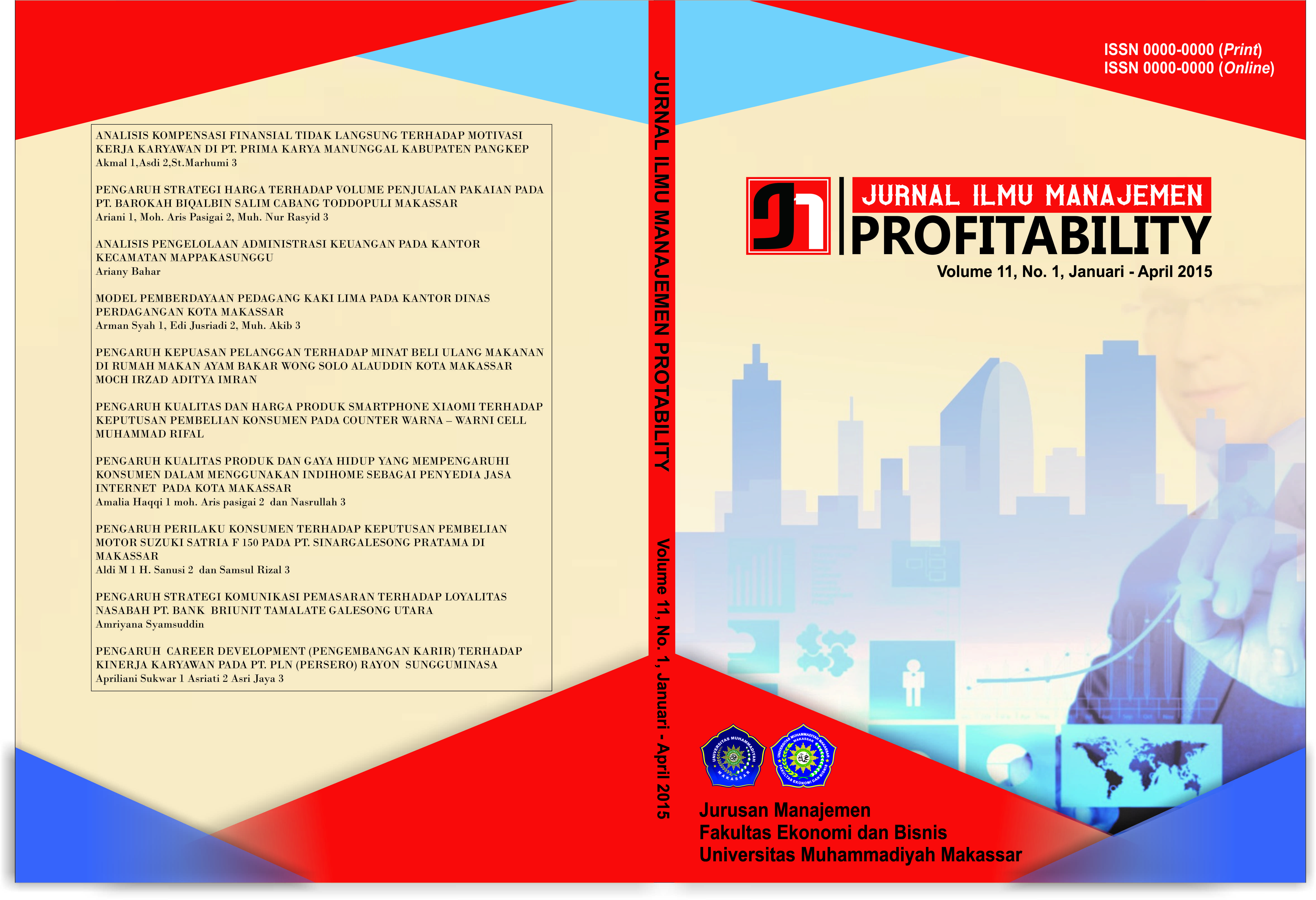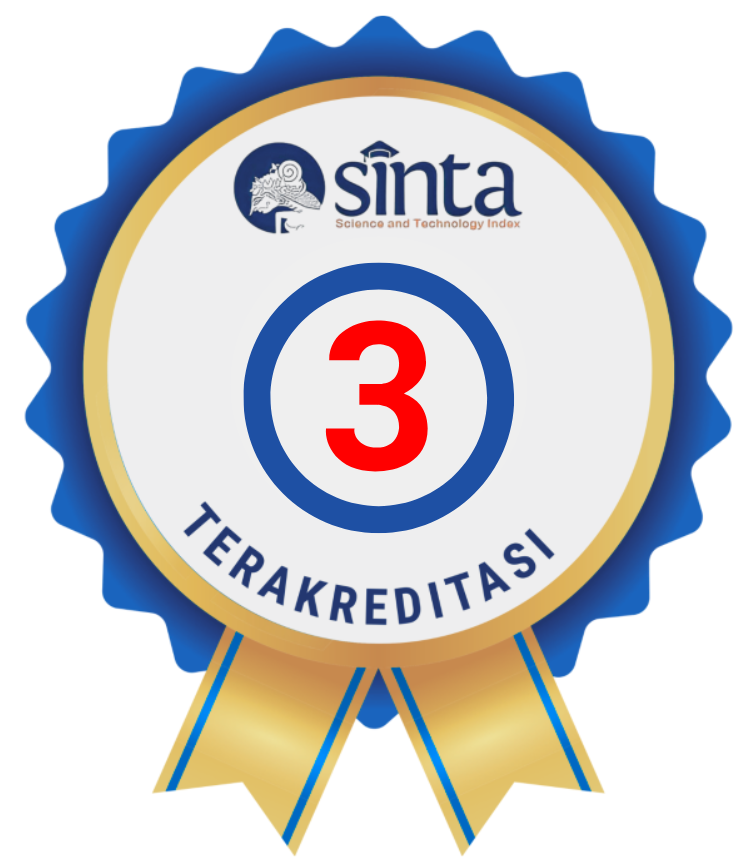PENGARUH PENGALAMAN DAN LINGKUNGAN KERJA TERHADAP KINERJA PEGAWAI PADA KANTOR BPKDBADAN PENGELOAAN KEUANGAN DAERAH KABUPATENTAKALAR
DOI: https://doi.org/10.26618/profitability.v3i2.2548
Abstract
MAYA SILVIANI, 2018, Effect of Experience and Work Environment on Employee Performance at Office BPKD (Local Financial Management Agency) Kab.Takalar, Thesis of Faculty of Economics and Business Faculty of Muhammadiyah University of Makassar. The type of data obtained through the questionnaire as a research instrument that describes the work experience, work environment and performance Employees. This study aims to find out how the experience and work environment affect the performance of employees at the office of BPKD (Local Financial Management Agency) Kab.Takalar. The results showed that the value of R Square is equal to 0.671 or 67.1%. This means variations in the power of influence of variables X1 (Experience) and X2 (Environment) of 67.1% of the variable Y (Performance). The remaining 32.9% is determined by other variables not examined in this study. This research model is stated to be good because the determinant coefficient value is close to 100% or 1. The results of the research show that the R Square value is 0.671 or 67.1%. This means variations in the power of influence of variables X1 (Experience) and X2 (Environment) of 67.1% of the variable Y (Performance). The remaining 32.9% is determined by other variables not examined in this study. This research model is stated to be good because the determinant coefficient value is close to 100% or 1
References
.A. Ahyari. 2005. Manajemen Sumber Daya Manusia dan Lingkungan Kerja.
Bandung : Pionir Jaya.
Amstrong, Michael dan Angela Barong, 2007. Manajemen Kinerja. Edisi ketiga. Jakarta : PT. Raja GrafindoPersada
Astono,J.D.2013.Tingkat Pendidikan ,Pengalaman Kerja,dan Gaya Kepemimpinan Terhadap Kinerja Melalui Disiplin Kerja Dinas Pekerjaan Umum Provinsi Kalimantan Tengah.Universitas Palangkaraya.
Basuki,Andi.2012.Pengaruh gaya kepemimpinan dan pengalaman Kerja terhadap kinerja Karyawan PT. Hamudha.Universitas SebelasMaret Surakarta.
Dr.Surya Dharma ,Mpa. (2005) Manajemen Kinerja, Pustaka Pelajar Yogyakarta.
Dwi .Septianto. (2010), Pengaruh lingkungan kerja dan stress kerja terhadap kinerja karyawan PT.Pataya Raya Semarang.Universitas Diponegoro Semarang.
Faris Ramanda Putra (2014), Pengaruh Lingkungan Kerja terhadap Kinerjakaryawan PT.Naraya Telematika Malang.Universitas Brawijaya Malang.
Foster, Bill, 2001. Pembinaan Untuk Peningkatan Kinerja Karyawan. PPM. Jakarta.
Hasibuan ,Malayu SP.2002 .Manajemen Sumber Daya Manusia.Jakarta : Bumi Aksara..
Martono, Nanang, 2010. Metode Penelitian Kuantitatif: Analisis Data Primer dan Sekunder, Edisi Rev.2. Jakarta: PT. Raja Grafindo Persada.
Mathis, Robert L., dan Jackson. 2012. Manajemen Sumber Daya Manusia. Jakarta: Salemba Empat
Nitisemito, Alex. S.2000. Manajemen Sumber Daya Manusia dan Organisasi, Jakarta.
Putra Dana Cahya (2012), Pengaruh Kemampuan Kerja dan Lingkungan Kerja terhadap Kinerja Karyawan Kecamatan Gayamsari kota Serang,Universitas Diponegoro.
Rofi,Ahmad Nur, 2012.“Pengaruh Disiplin Kerja dan Pengalaman Kerja terhadap Prestasi Kerja Karyawan pada Departemen Produksi PT. Leo Agung Semarang”.Jurnal Ilmu Manajemen dan Akuntansi Terapan. Sekolah Tinggi Ilmu Ekonomi Totalwin Semarang.
Robbins, Stephen P.2008. Perilaku Organisasi. Jakarta :Penerbit Salemba Empat.
Siregar, Syofian, 2013. “Metode Penelitian Kuantitatif”, Jakarta, Kencana Predana Media Group .
Sugiyono.2007.Metode Penelitian Kuantitatif Kualitatif R&D.
Bandung: CV. Alfabeta
Sutrisno, Edy, 2010. Manajemen Sumber Daya Manusia. Jakarta: Kencana.
Downloads
Published
Issue
Section
License
Authors who publish with Jurnal Ilmu Manajemen Profitability agree to the following terms:
Copyright of the articles remains with the authors.
Authors grant the journal the right of first publication with the work simultaneously licensed under a Creative Commons Attribution-NonCommercial 4.0 International License (CC BY-NC 4.0). This license allows others to:
Share (copy and redistribute the material in any medium or format)
Adapt (remix, transform, and build upon the material)
as long as they give appropriate credit to the original author(s) and source, provide a link to the license, and indicate if changes were made. Non-commercial use only.
Authors are permitted to:
Distribute their published work (e.g., post it to an institutional repository or publish it in a book), with an acknowledgment of its initial publication in this journal.
Enter into separate, additional contractual arrangements for the non-exclusive distribution of the journal’s published version of the work (e.g., post it to a class website or institutional archive).
For permissions to use the content published in this journal beyond the scope of the license (e.g., commercial purposes), please contact the editorial office via the journal email.
License Details:
This journal is licensed under a Creative Commons Attribution-NonCommercial 4.0 International License (CC BY-NC 4.0).












